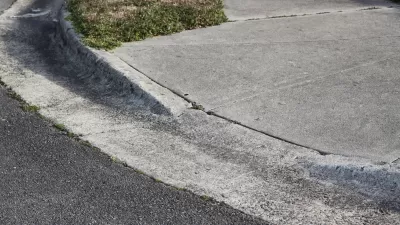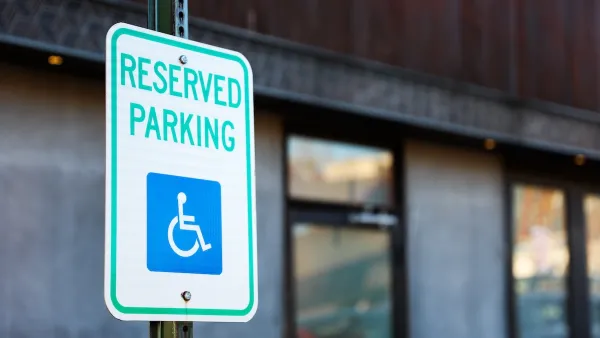Designed to thwart predatory lawsuits, the bill could make it easier for businesses to ignore barriers to access, disability rights advocates say.

The House has passed an amendment to the Americans With Disabilities Act that would make it harder to sue businesses for failing to meet accessibility standards. "Under the bill, those wishing to sue businesses in federal court over an ADA public-accommodations violation must first deliver a written notice to that business detailing the illegal barrier to access and then give that business 60 days to come up with a plan to address the complaints and an additional 60 days to take action," Mike DeBonis explains in The Washington Post. The changes would apply to places open to the public, like stores, restaurants, or hotels.
Supporters say the ADA Education and Reform Act would protect businesses from excessive or frivolous lawsuits. But critics and disability rights advocates say there are better ways to address those abuses, without shifting the burden of ADA compliance to the individuals facing exclusion. Senator Tammy Duckworth, who uses a wheelchair, tweeted about the potential impacts of the amendment ahead of its move to the Senate:
Supporters of #HR620 don’t deny that they’re violating the law—they just resent being sued for “minor” #ADA infractions. But an incline that is “only” a few degrees too steep, or an entrance that is “only” a few inches high, can determine if I’m able to access an area w/out help.
FULL STORY: House passes changes to Americans With Disabilities Act over activists’ objections

Maui's Vacation Rental Debate Turns Ugly
Verbal attacks, misinformation campaigns and fistfights plague a high-stakes debate to convert thousands of vacation rentals into long-term housing.

Planetizen Federal Action Tracker
A weekly monitor of how Trump’s orders and actions are impacting planners and planning in America.

In Urban Planning, AI Prompting Could be the New Design Thinking
Creativity has long been key to great urban design. What if we see AI as our new creative partner?

King County Supportive Housing Program Offers Hope for Unhoused Residents
The county is taking a ‘Housing First’ approach that prioritizes getting people into housing, then offering wraparound supportive services.

Researchers Use AI to Get Clearer Picture of US Housing
Analysts are using artificial intelligence to supercharge their research by allowing them to comb through data faster. Though these AI tools can be error prone, they save time and housing researchers are optimistic about the future.

Making Shared Micromobility More Inclusive
Cities and shared mobility system operators can do more to include people with disabilities in planning and operations, per a new report.
Urban Design for Planners 1: Software Tools
This six-course series explores essential urban design concepts using open source software and equips planners with the tools they need to participate fully in the urban design process.
Planning for Universal Design
Learn the tools for implementing Universal Design in planning regulations.
planning NEXT
Appalachian Highlands Housing Partners
Mpact (founded as Rail~Volution)
City of Camden Redevelopment Agency
City of Astoria
City of Portland
City of Laramie





























